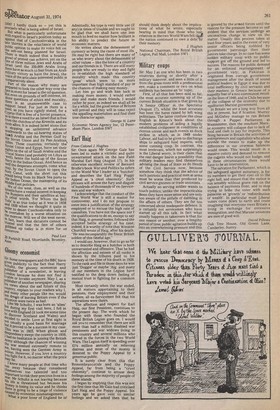Earl' Haig
From Colonel J. Hughes '
Sir: Once again Mr George Gale has been. led to make a vitriolic and quite unwarranted attack on the late Field Marshal Earl Haig (August 17). In his otherwise excellent review of Bernard Brodie's book Warand Politics he refers to the World War I leader as a 'butcher' and describes the Earl Haig Poppy Appeal as 'a cruel obscenity'. Such phrases will arouse the fury and disgust of hundreds of thousands of ex-Servicemen and war widows.
I acknowledge that the conduct of the First World War is still a matter for controversy, and I do not propose to enter into a justification of the strategy employed or to excuse the high rate of casualties. You have not the space nor I the qualifications to do so, except to say that Haig, in general terms, followed the accepted battle strategy of his time; indeed, it is worthy of note that Winston Churchill wrote of Haig, after his death: "He was incomparably the finest British soldier of this fateful age."
I would say, however, that to go so far as to describe Haig as a butcher is both unwarranted and offensive. That he had the affection and esteem of all ranks is shown by the tributes paid to his memory at the time of his death in 1928. To the rank and file in those days he was just 'Duggie' or maybe 'Aig' and many of our members in the Legion have testified to the deep down feeling of mutual trust in fighting for a common cause.
Most certainly when the war ended, in all matters appertaining to their pensions, their employment and their welfare, all ex-Servicemen felt that his aspirations were theirs.
The affection and respect for Earl Haig, our first President, continues to the present day. The work which he began with those who founded the Royal British Legion goes on. I would ask you to remember that there are still more than half a million disabled war pensioners and war widows living in this country and several millions who served in the forces in the two World iWars. The Legion itself is spending over EPA million annually on relieving distress and most of the money is donated to the Poppy Appeal by a generous public.
It is surelyclear front' this that Remembrancetide and the Poppy Appeal, far from being a "cruel obscenity", continue to arouse deep feelings among the majority of people of these islands.
I began by implying that this was not the first time that Mr Gale had criticised Earl Haig and the Poppy Appeal. Six years ago he gave vent to similar feelings and we asked then that he
should think deeply about the implications of what he wrote, especially bearing in mind that those who los relatives in the two World Wars felt tlia the nation continued to owe a debt-to. their memory.
J. Hughes National Chairman, The Royal British Legion, Pall Mall, London SW1


































 Previous page
Previous page